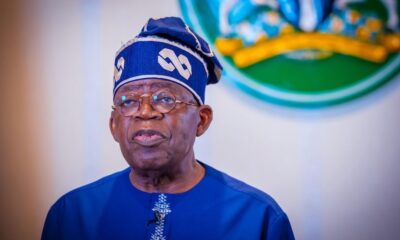S&P’s latest position places Nigeria on a stronger footing ahead of future reviews and sends a positive message to global investors assessing opportunities in Africa’s largest economy.
Business
President Tinubu Launches 2,000 Tractors For Agri-Drive
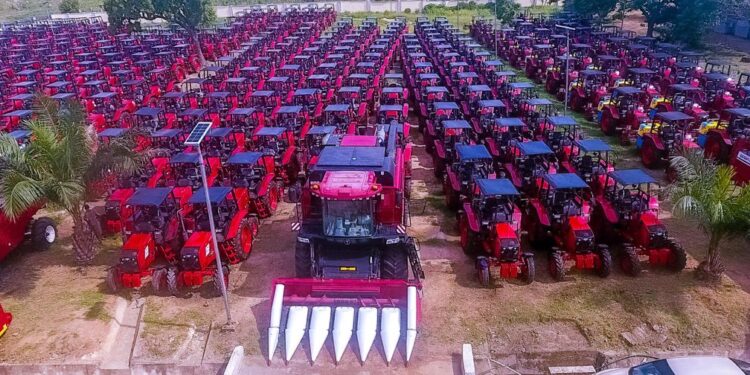
President Bola Ahmed Tinubu has launched 2,000 tractors under the Renewed Hope Agriculture Mechanization Programme (HEDA).
This disclosure is contained in a post by the Special Adviser to the President on Media and Public Communication, Sunday Dare, on his official X (formerly Twitter) account on Monday, June 23, 2025.
Dare, in his statement, revealed that 9,000 specialized farming implements were also launched.
What the president said
According to the statement, President Bola Tinubu recalled declaring an emergency on the agricultural sector in order to achieve food security two years ago.
The statement further quoted the President saying the newly launched equipment would make farming easier and introduce a 21st-century farming system.
“…Two years ago, we made a promise when we came in on a Renewed Hope agricultural program. Then I declared an emergency in Agriculture towards achieving food security and sovereignty, which is the Bedrock of any prosperous nation.
“We envision Nigeria as a global power supplying quality farm products around the world. We are just beginning. We will do more. These modern implements will make farming easier and more sexy. We don’t have to use 18th-century methods for a 21st-century farming system. Nigeria must seek to achieve full agricultural independence and food security. Let history record this day as the beginning of Nigeria’s Agricultural renewal…”
The multi-billion-dollar equipment, delivered under the Nigeria-Belarus partnership, represents the largest agricultural mechanization initiative in the country’s history. President Tinubu is expected to inaugurate the tractors in Kwali, Abuja.
What you should know
The Federal Government had earlier, in February 2025, received a boost in its agricultural mechanization drive with the delivery of the first batch of 2,000 Belarus tractors.
It could be recalled that President Bola Ahmed Tinubu approved the purchase of 2000 tractors from Belarus, an eastern European country.
The Minister of Agriculture and Food Security, Senator Abubakar Kyari, made the revelation when he paid an unscheduled visit to the site to see for himself the number of units delivered so far and how many the country is still expecting.
He said, “We are excited that we have received more than 30%. As we were leaving, another two trucks just arrived.
“The tractors would be deployed for the 2025 wet season farming. We have enough spare parts for the next four years. We will train youths in 774 LGAs.’’
The minister, during the inspection, expressed satisfaction with the progress of the Nigeria-Belarus mechanisation partnership, which was formalised in September 2024.
Kyari said, “As we speak, over 200 containers carrying tractors and implements have arrived in Lagos, with about 20 containers currently in transit to Abuja. Today alone, we have successfully taken delivery of five containers, each carrying three tractors, making a total of 15 tractors in this batch.
“Under this initiative, 2,000 tractors are being deployed, each complemented by 9,072 assorted agricultural implements designed to support different farming operations. The tractors come in four models tailored for various terrains and farming needs: 90-horsepower (2-wheel drive), 90-horsepower (4-wheel drive), 80-horsepower (2-wheel drive), and 80-horsepower (4-wheel drive).
“Each category consists of 500 units to ensure that farmers across the country have access to the appropriate machinery.
“This delivery is a direct fulfilment of President Bola Ahmed Tinubu, GCFR’s Renewed Hope Agenda, which prioritises agricultural mechanisation as a key driver of food security and rural economic growth.’’
The federal government is expected to use three models to distribute the equipment to maximise impact.
The three key schemes include direct purchase for individuals and organisations seeking to acquire them outright; a leasing scheme that provides affordable access to mechanisation without full ownership costs; and a service provider model that establishes tractor service centres in farming communities, allowing smallholder farmers to lease tractors as needed.
Nairametrics.com
Business
2025 Net Worth: Meet Nigerian Billionaire Who Has Made More Money Than Aliko Dangote
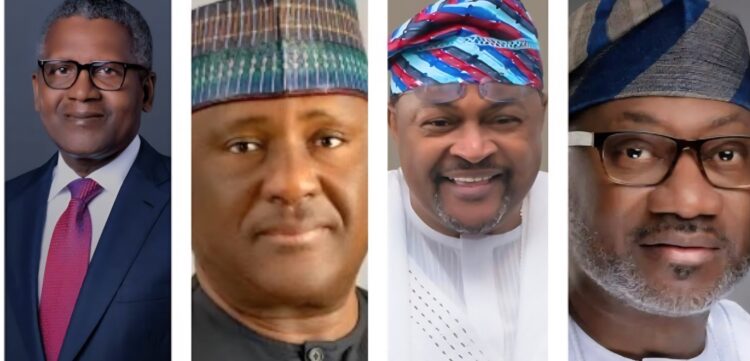
Abdulsamad Rabiu, the founder of BUA Group, has emerged as the fastest-growing African billionaire in 2025.
His wealth rise in 2025 is higher than Africa’s richest man, Aliko Dangote and other African billionaires.
According to the latest data from the Bloomberg index, Rabiu’s net worth has increased by $5.25 billion in 2025, bringing his total net worth to $8.4 billion as of Friday, November 14.
In comparison, Dangote who has a total net worth of $29.8 billion, has gained $1.75 billion from January to November 14, 2025.
The increase in Rabiu’s wealth is thanks to the performance of his key assets on the Nigerian Exchange: BUA Cement and BUA Foods, two of the largest companies in the country.
However, Dangote remains Africa’s wealthiest individual for total net worth
A Lagos-based financial analyst, Kelvin Umeni, said: “Rabiu’s companies have been performing strongly. If you check the half-year results of his two companies, you will realize he is doing very well. I am not surprised, and I expect him to hit a $10 billion net worth soon.”
Other African billionaires on the Bloomberg billionaire index have also recorded impressive gains this year but not at the same pace with Rabiu.
Johann Rupert, Africa’s second-richest man, has a total net worth of $18.4 billion as at Friday, an increase of $4.79 billion from the start of the year. His wealth is driven by stakes in Richemont.
Nicky Oppenheimer, another South African billionaire known for his holdings in De Beers, has gained $2.18 billion so far in 2025, bringing his wealth to $13.7 billion. While Egyptian billionaire Naguib Sawiris wealth totals $10.1 billion, which is a YTD increase of $3.23 billion.
His fellow countryman, Nassef Sawiris net worth currently stands at $9.42 billion, a $727 million growth in 2025.
South African entrepreneur Natie Kirsh fortune has increased by $530 million, taking his total net worth to $9.86 billion.
It is important to note that Dangote remains Africa’s richest man by a distance, but for wealth gain in 2025, Abdulsamad Rabiu is the rising star.
Business
CBN Gov Welcomes S&P’s Upgrade Of Nigeria’s Outlook To Positive
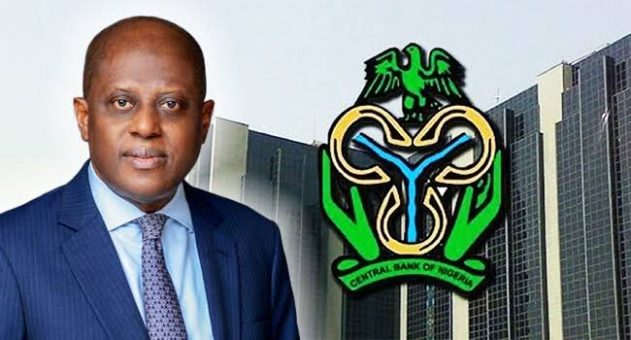
The Central Bank of Nigeria (CBN) Governor, Olayemi Cardoso, has welcomed the decision of S&P Global Ratings to revise Nigeria’s outlook to “positive” from “stable,” describing it as a signal that reforms in the financial system are gaining traction.
S&P announced the upgrade on Friday citing improving policy coordination, strengthened monetary management and steps taken to restore confidence in the Nigerian economy.
The revision shows that Nigeria is now viewed as having a better chance of achieving stronger credit fundamentals over the medium term. This means S&P now sees Nigeria as more likely to strengthen its economic and financial stability in the coming years, based on recent policy improvements.
In practical terms, the agency believes the country has a stronger chance of earning a future credit rating upgrade if current reforms are sustained.
Speaking at a strategic session in Abuja, Cardoso said the development reflects the steady progress recorded in stabilizing key economic indicators since the beginning of the year.
According to him: “This is encouraging news for the country. It shows that our efforts to restore stability, strengthen governance frameworks and rebuild trust in the financial system are being recognized internationally.”
The Governor noted the CBN’s actions—ranging from tighter monetary policies to enhanced foreign exchange market operations—have contributed to clearer market signals and better investor confidence.
“The Central Bank has brought stability to the economy and become a beacon of hope,” he stated.
Cardoso added that the improved outlook should motivate both public and private sector stakeholders to sustain ongoing reforms that support growth, investment, and long-term macroeconomic resilience.
Business
Nigeria Targets ₦160bn From Wheat Production
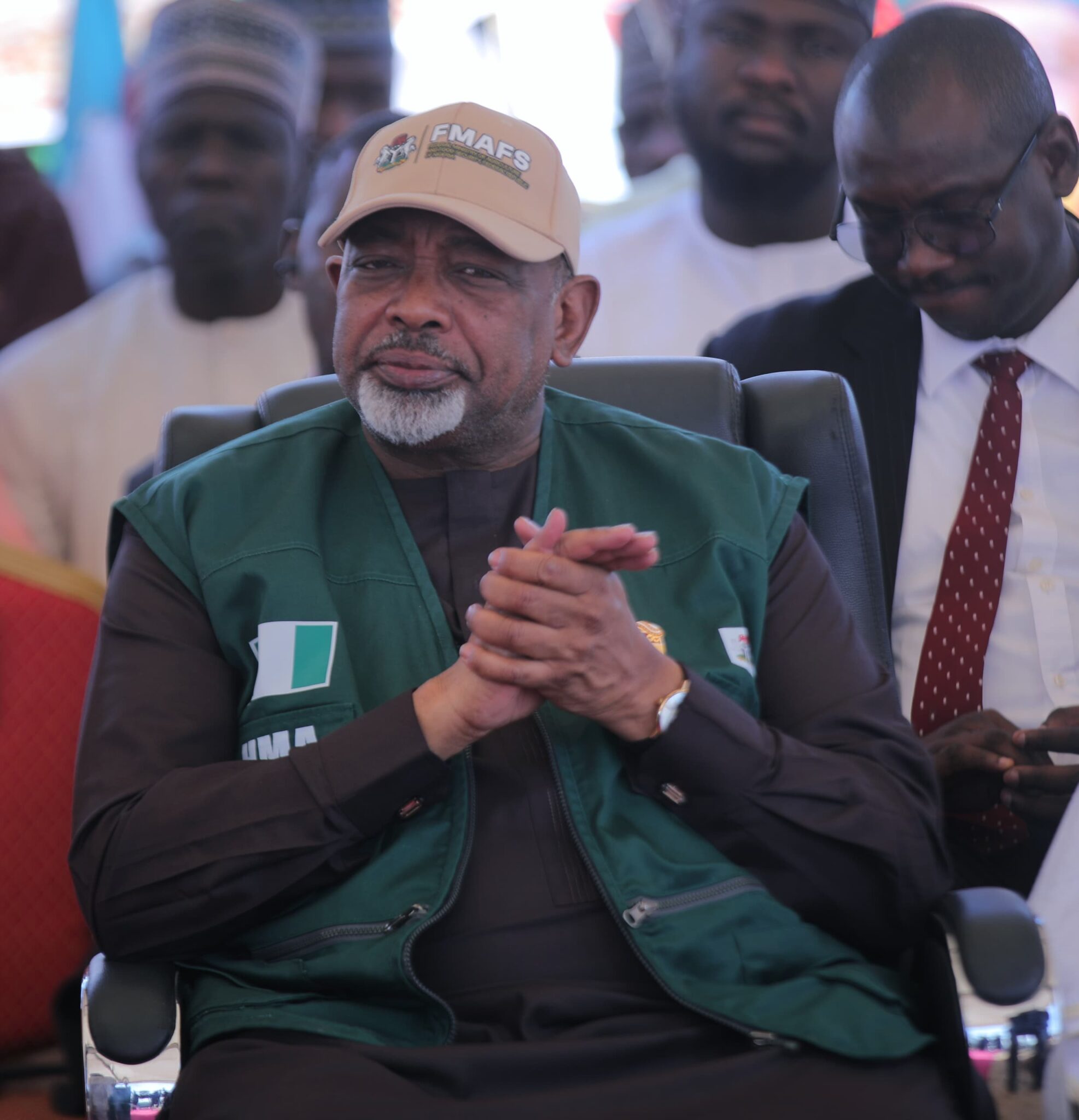
The Federal Government on Saturday said it has earmarked 40,000 hectares of land for 2025/2026 dry season wheat production and registered 80,000 farmers, with an expected output value of approximately ₦160 billion.
The Minister of Agriculture and Food Security, Abubakar Kyari, disclosed this during the official flag-off of the 2025/2026 dry season wheat production programme under the National Agricultural Growth and Agro Pocket Project (NAGSAP) in Jere Local Government Area of Borno State.
Speaking at the ceremony, the minister said that out of the 40,000 hectares earmarked for wheat production this dry season, 3,000 hectares have been allocated to Borno State, representing 6,000 registered wheat farmers.
He said: “Under the 2023/2024 dry season wheat production programme, a total of 107,429 registered farmers were supported with critical subsidized inputs, resulting in an output valued at ₦474,628,000 billion. During the 2024/2025 dry season, 279,297 registered farmers received support, with an output valued at ₦893,750,004 billion.
“For the current 2025/2026 season, the programme is targeting 80,000 registered farmers with an expected output value of approximately ₦160 billion.”
Kyari emphasized that the NAGSAP programme will deploy Agricultural Extension Agents to guide farmers on modern agronomic practices and provide continuous field-level advisory services.
“In addition, Fertiliser and Seed Quality Control Officers will be mobilised to ensure that all inputs delivered to farmers meet the required standards, thereby guaranteeing higher productivity and improved yields,” Kyari added.
According to him, the wheat component of the NAGSAP programme covers sixteen states of the federation.
“These are Adamawa, Bauchi, Borno, Cross River, Gombe, Kaduna, Kano, Kebbi, Niger, Plateau, Sokoto, Taraba, Yobe, and Zamfara. The inclusion of Cross River last year expanded wheat production into the southern region for the first time and strengthened our national capacity to diversify production across ecological zones,” he said.
Kyari noted that the project is designed to include women and young people, enabling them to access training and agricultural opportunities.
“NAGSAP is deliberately designed to leave no one behind. The program ensures that farmers across communities—including women and young people, who play vital roles in our agricultural workforce—have equitable access to inputs, training, and opportunities.
“The success of any agricultural season depends on the quality of inputs that reach our farmers. Without certified seeds, accurate fertilizer blends, and timely access to crop protection products, no level of effort in the field can deliver the yields we require as a nation. This is why NAGSAP places strong emphasis on input quality, traceability, and transparent delivery systems, ensuring that every farmer receives the right inputs at the right time to achieve higher productivity and better returns,” he said.
Also speaking, the Governor of Borno State, Babagana Zulum, applauded the Federal Government for its continuous support towards irrigation development.
“Mr President’s commitment to food security and national productivity provides the foundation upon which programs like this are built,” he stated.
According to him, Borno State, with its vast arable and irrigable land—especially within the Lake Chad Basin—remains one of Nigeria’s most promising agricultural frontiers.
He said: “Today is more than a ceremony; it is a celebration of hope, resilience, and our unwavering commitment to ensuring that no family in Borno State goes hungry and no farmer is left behind. Despite the challenges of displacement, insecurity, and climate shocks, Borno State remains steadfast in growing its own food and empowering its people.”
The governor reaffirmed his administration’s commitment to sustaining all-season farming through the provision of essential infrastructure, logistics, modern machinery, improved seeds, fertilizers, agrochemicals, and other inputs required to boost productivity and support farmers across the state.
“Here in Borno State, wheat cultivation is not just a program; it is a transformative initiative. Through targeted investments in irrigation, mechanization, quality inputs, and extension services, we are equipping farmers to achieve higher yields, enhance productivity, and contribute meaningfully to national output.”
He further stated: “Borno State has achieved remarkable milestones under our people-centered agricultural vision. Our input support programmed have reached tens of thousands of smallholder farmers, resettled households, women, and youth, providing improved seeds, agrochemicals, and agronomic guidance.”
-
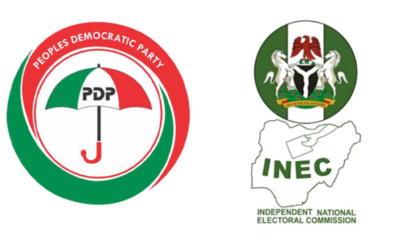
 Politics2 days ago
Politics2 days agoINEC Rejects Mohammed As PDP Acting Chairman
-
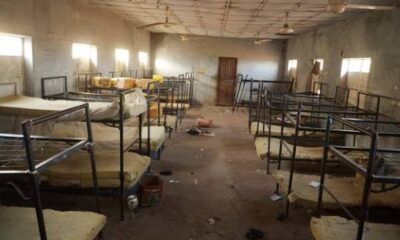
 News2 days ago
News2 days agoNames Of Kidnapped Kebbi School Girls Released
-
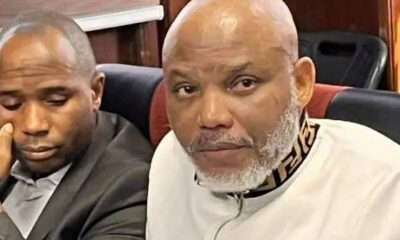
 News1 day ago
News1 day agoJudge Declares Nnamdi Kanu An ‘International Terrorist’
-

 News1 day ago
News1 day agoNAF Launch Fresh Airstrikes On Terrorists Hideout In Sambisa Forest
-
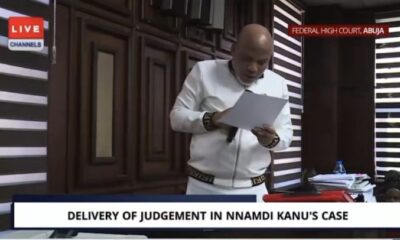
 News1 day ago
News1 day agoCourt Finally Delivers Judgement In Nnamdi Kanu’s Terrorism Case
-
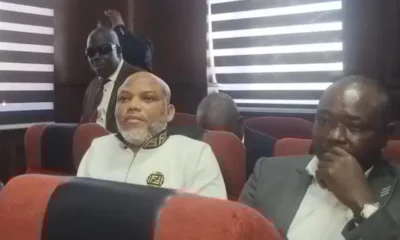
 News1 day ago
News1 day agoJust In: FG Urges Court To Impose Death Sentence On Nnamdi Kanu
-
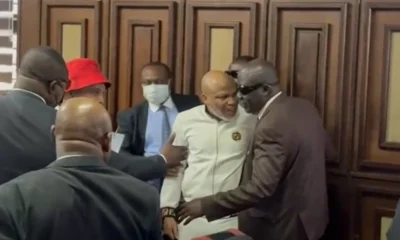
 News23 hours ago
News23 hours agoBREAKING: Court Sentences Nnamdi Kanu To Life Imprisonment

